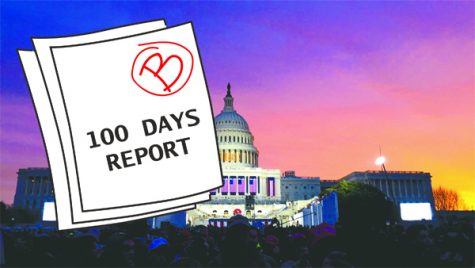President Trump signs executive order, starts the dismantling of the ACA
January 27, 2017
As pledged, we are going to see an entirely new healthcare system in the impending months. Last Friday, President Trump signed an executive order that helps him follow through with one of his central campaign promises.
President Trump swiftly acted on his promise, signing the executive order only a few hours following his swearing in ceremony.
It directs the secretary of health and human services and agencies to interpret regulations as loosely as allowed under the law to minimize the burden on individuals, families, healthcare providers and more.
The intention of the executive order is to ease the financial burden of Obamacare on individuals, states, health care providers and others. CNN reports the executive order allows the health secretary to loosen provisions with his use of waivers or to allow states the ability to implement certain parts of the law, particularly the expansion of Medicaid.
Without a replacement of any kind, we’re opening up a large gap for lower wage Americans. The ACA allowed many luxuries that they’ve never had before and are now in danger of losing.
— Antonia Kalal, Student at UND
Kellyanne Conway, an adviser to President Trump, told NBC News Today, that Obamacare will be replaced with a health care law that turns Medicaid into a block grant program, meaning states would be given money by the federal government to implement Medicaid as they see fit.
NPR reports that block grants have several forms. One option entails the federal government offering a fixed sum of money to each state, which would grow with inflation. As a result, spending would dwindle over time since the rate of inflation overall is often lower than inflation in the healthcare sector.
As a result, this type of block grant affects the amount of money available when the economy is suffering and more people are eligible to sign up for Medicaid.
An alternative scenario, NPR reports, would offer states an allowance for each beneficiary. Therefore spending would increase during economic instability to cover those who need care. Contingent on this scenario is how programs would account for rising health care costs, because overall benefits still could fall over time.
Despite these possible scenarios, a definitive plan hasn’t been set into place. However, Conway stressed that President Trump intends to keep his promise, that “everybody” will have health insurance, according to NPR.
We have been talking about improving health care since the Clinton administration, and the ACA was the first concrete action taken.
— Rebecca Leber-Gottbery, Humanities and Integrated Studies Department
President Trump has urged Congress to act quickly in putting forth legislation that replaces Obamacare. On Monday, two Republican senators introduced legislation they described as an “Obamacare replacement plan” according to CNN.
The proposal, introduced by Sens. Bill Cassidy of Louisiana and Susan Collins of Maine, would give more power to the states on healthcare policy while simultaneously increasing access to affordable insurance to cover Americans who are currently uninsured. Basically, if a state is satisfied with Obamacare, it will be able to keep it—according to the proposal.
The intent to repeal and replace Obamacare concerns millions of Americans. Former President Barack Obama’s health care law covers more than 20 million people, and many fear that taking the action to repeal the law could result in instable insurance markets and loss of people’s coverage.
The executive order President Trump signed last Friday sets in motion his intentions to repeal Obamacare, there hasn’t been a formal plan as to how it will be replaced.
The uncertainty surrounding the future of healthcare is a concern for students and faculty as well. Senior Antonia Kalal spoke with Dakota Student about changes taking place in the healthcare system.
“Without a replacement of any kind, we’re opening up a large gap for lower wage Americans,” Kalal said. “The ACA allowed many luxuries that they’ve never had before and are now in danger of losing.”
Kalal is concerned about the ramifications of repealing the Affordable Care Act as is Dr. Rebecca Leber-Gottberg of the Humanities and Integrated Studies department. Dr. Leber-Gottberg sees the intent to repeal without a replacement as problematic to the overall healthcare system.
“We have been talking about improving health care since the Clinton administration, and the ACA was the first concrete action taken,” Leber-Gottberg said. “Congress has had 8 years to come up with something better and have not. So to repeal without a viable replacement is unconscionable and irresponsible.”
Sens. Bill Cassidy of Louisiana and Susan Collins of Maine, recognize the fear many Americans share about instability in the insurance markets as a result of repealing the law. In an interview with CNN, Collins acknowledged the importance that patients don’t experience gaps in coverage.
“We recognize that our bill is not perfect. It is still a work in progress. I expect that we will get many ideas from my colleagues for further refinements and we are completely open to that,” Collins said. “But if we do not start putting specific legislation on the table that can be debated, refined, amended and enacted, then we will fail the American people.”
Republicans in Congress will continue the legislative process of finding a viable replacement to the Affordable Care Act. CNN reports that a final repeal bill isn’t likely to be seen by President Trump for weeks, if not months.
This story will further develop as Congress continues to deliberate how to replace the Affordable Care Act
Liz Kacher is a staff writer for The Dakota Student. She can be reached at [email protected]




